The hour is approaching midnight and I’ve lost Robert Sheehan. He went off to take a phone call from his partner and subsequently vanished into the labyrinth of rooms and alcoves that make up the gigantic Galway pub where we have been doing our interview. The place is practically empty so he shouldn’t be too hard to locate, but there’s no rush, I’m sure he’ll show up soon enough. Besides, the barman has just placed a pint of Guinness in front of me. “From your man there,” he smiles, referring to the erstwhile interviewee. Mine is not an impartial judgement but it strikes me as a very classy move.
It is also an unnecessary one. Thirty minutes earlier, two girls came and perched on our table. “They’re gonna steal your laptop, man,” grins Sheehan. (It’s recording our conversation.) Perhaps their intention was indeed larceny; perhaps the old English accent was working its magic. I later suggest this possibility to Sheehan. “The English accent goes down a storm in Ireland,” he deadpans in response.
Most likely, the girls wanted to talk to the famous actor and that’s fine; the actor enjoys talking to people. We chat away, continue with the interview, and then Sheehan goes off to take his phone call. In his absence, one of the girls insists I try a pint of Murphy’s, which is apparently Guinness but better, and very kindly orders me one without my even realising. The Murphy’s arrives at the same time as Sheehan’s Guinness – so now I’m double parked. Double parked on a Friday night in Galway. I guess there are worse situations.
I had hoped an interview with Sheehan would be as brilliant and chaotic as its subject but this one has exceeded my expectations. Our day together started on the beach at Salthill; encompassed the wonderful new play Reunion at the Black Box Theatre (me in the audience, him up on stage); and has ended up at McSwiggan’s, a handsome pub and restaurant that leans enough into the restaurant aspect of its incarnation to be basically the only venue in Galway capable of hosting a quiet conversation on a Friday night.
There is much to discuss. The fourth and final season of Netflix superhero show The Umbrella Academy. His Withnail in the recent theatrical adaptation of Withnail and I – few castings can be more perfect than Sheehan as the rakish bohemian with charisma to burn. His book of short stories Disappearing Act and upcoming memoir Playing Dead, a beautiful reflection on meditation filtered through his own discovery of the practice. And Reunion, of course – two hours ago, he was accepting a standing ovation from a full house.
The standing ovations are a nightly occurrence that he’s trying not to take for granted. Mark O’Rowe’s one-act play depicts a family returning to the small island of their childhood to share a meal at the house of their widowed mother. The cast of ten all deliver spectacular performances and early reviews have been laudatory; “a zinger of a play that doesn’t flag for a second,” says the Irish Independent, an opinion I’ll happily second. The cast suspected they had a winner, but Sheehan admits he didn’t fully appreciate the script’s comedy until seeing its effect on a live audience. “It’s the first play to ever change genres when put on stage!”
Sheehan has been a successful actor since adolescence. What he hasn’t always been is happy: it was his loneliness when filming in Portland that led to him first try meditation in 2017 and begin the journey that would produce Playing Dead. It’s a loose, rococo breeze of a book, a mixture of memoir and meditation manual with musings on everything from prayer to psychogeography to Shakti energy. (You also get plenty of sex, alcohol and fame.) He wanted to write about meditation from a personal perspective, root its often abstract and amorphous concepts within individual experience. Some books dictate to you, some books converse with you; Playing Dead is one of the latter.
“I’m basically a rookie,” he tells me in the pub. “Trying to talk in a way like I know something. But really, ‘knowing’ is about a certain position in time-space. It’s naive from one perspective and it’s wise from another. So I’m wary of trying to come across too wise. We’re getting fucking circled!” The last comment is in reference to the two girls who, after studying my companion for several minutes, finally decide to make a beeline for the table.
Having momentarily come full circle ourselves, let’s do something that Sheehan would appreciate. Let’s take a breath.

SHOP THE LOOK: Double breasted suit jacket and trousers: Hugo Boss; knitted jumper: Sunflower; Boots: Our Legacy
Here’s an extract of our conversation in McSwiggan’s, edited for coherence.
Square Mile: What made you write a book about meditation?
Robert Sheehan: Aw, fuck. You know, in the last three months, I’ve started practising how to answer certain questions. I was finding myself struck dumb when it came to being able to talk coherently about the book – even though I’d spent the last five years writing the book. And so whenever a good answer came, I’d write it down.
I started writing the book when meditation started getting really good and really nice. All these creative, honey-lacquered ideas and impulses would arise. You go, ‘I dunno what it is exactly but I’ve got to write it down.’ What came out was about meditation itself – as opposed to bowling or cricket or hurling or something. It was about the meditation itself and the transformation, the inwardness of it all.
After 2020, I had reams of stuff. Big lumps of raw material. Some of it had subconscious rhythm and poetry to it. The hard part was giving it a story style – easy to read, anecdotal. That’s the style of talking I most enjoy from myself and other people – when someone’s telling a story. You don’t get stories in a lot of them meditation books. You get zinger sentences but there’s not a lot of good craic stories.
SM: Rooting meditation in your individual experiences makes the book very accessible…
RS: It doesn’t take climbing an extremely dangerous mountain or having years of credentials to have a genuine, legitimate meditation practice. If I’m to toot my own horn very quietly here, I’d say that’s the difference with my book. It was something going really well in my life [acting] that led to the misery, which ultimately started the meditation. The thing that I really wanted to do, the thing that would complete me.
SM: You seem like a man who’s constantly searching for something.
RS: Yeah, maybe you’re right. Yeah, you’re right. I suppose the practice of meditation is the sanctuary from searching, where you give yourself loads of time off. Not being told what to search for by your consciousness, but sit down and look at what you’re being told to search for – ‘Oh, you have to do that email’. It’s a fucking mad, extraordinary thing.
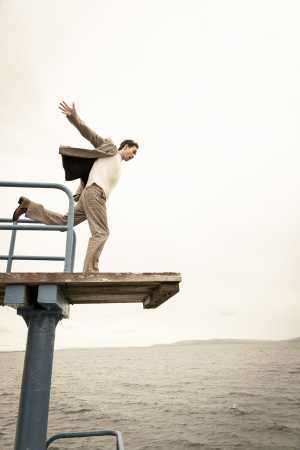
SM: I’ve tried meditation in the past, not very successfully. I found my phone stayed in my head the entire time.
RS: In what aspect did your phone stay in your head?
SM: Just a message I need to send. Or wondering if someone has messaged me. Because you’re alone with your thoughts, you immediately focus on your impulses.
RS: Your impulses to do things. That’s the first station, if you will. If meditation is getting on a train, the first station that it arrives at is, ‘Fuck, I’ve got to do that thing!’ It’s the same for everyone. You stay on the train, you don’t get off and do the thing. You go, ‘No, I’m not going to follow any of them impulses.’
And then the next thing that comes up is older things that you said you’d do but you still haven’t done. Now this is a station that lots of us get off at because they’re deeper and they’re harder to achieve. And then you’re in your pre-conscious, I suppose, as Freud would say. You stay on the train and you go, ‘Alright, I hear you, but I’m not doing them either. I’m just watching you asking me to do them.’
SM: That’s the one you have to push past?
RS: Not push. Allow for the push but don’t push or pull. There’s kind of a sweet spot. But it does take time. It takes time.
SM: Anything worth doing does.
RS: Doesn’t it? It refines one’s interface with themselves and the external reality in such a way that you get more subjective time, you live a life that you’re more in control of. Basically, you internalise things in a more ordered fashion.
You trust more in your mind because you know that things have become internalised in a more ordered way. You don’t worry about having to think of them because you know that they’re there.
Robert Sheehan was raised in the Irish town of Portlaoise by parents who encouraged their three children to dream. His father Joe, a garda officer, instilled a love of reading – the dedication to Disappearing Act thanks Joe “for all the words and poetry”. His mother Maria was a civil service registrar. She suggested a teenage Robert audition for the film Song for a Raggy Boy, and escorted her son to Dublin over the arduous 18-month process. His brother Brendan, incidentally, was twice voted Mr Ireland: “He looked like a fucking Oscar. All painted dark bronze.”
He got the gig, then several more gigs. Playing Louis XIV in the TV series Young Blades, the 16-year-old Sheehan spent six months filming in Vancouver, where he lived with one of the production managers. It was his first experience of the loneliness that can suffuse an actor’s existence: months away from home in an unknown city, working with people who are essentially strangers. Some 13 years later, Sheehan was housebound by a blizzard while filming a movie in Portland. The resulting loneliness led him to attempt meditation for the first time.
He spent a year studying film in Galway but never passed the course. In front of the camera, his career was taking flight. He played a male prostitute in Red Riding; a juvenile delinquent with superpowers in Misfits; a sensitive hitman in Love/Hate. Major roles in three seminal TV shows, each would be a highlight of any actor’s career, and he had them all on his CV aged 25.
(A word on Misfits. The E4 show launched multiple careers – Iwan Rheon, Antonia Thomas, Nathan Stewart-Jarrett – and even amid a uniformly brilliant young cast, Sheehan stole every scene as the wisecracking Nathan, a role that landed him a BAFTA nomination.)
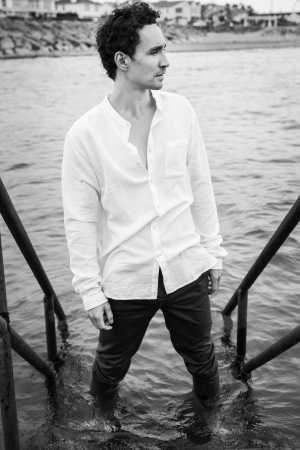
SHOP THE LOOK: Shirt: Oliver Spencer; trousers: Magee 1866
In 2013, he landed a lead role in teen fantasy adaption The Mortal Instruments: City of Bones. It was hyped as the next Twilight but received a critical and commercial shellacking, and the proposed franchise never materialised. (Five years later, another teen fantasy, Mortal Engines, also failed at the box office. Funnily enough, his two most celebrated characters – Nathan and Klaus – both happen to be immortal.)
The Umbrella Academy made him famous around the world. Adapted from the comics by Gerard Way, the show follows a dysfunctional adopted family who happen to possess superpowers. Sheehan’s flamboyant, drug-addled Klaus is a fan favourite, a common theme with his characters. In Playing Dead, he describes Klaus as “someone who knows deep down what pain barriers he must cross to feel less pain, but refuses to cross them because it’s too painful” – a description so good I can’t resist using it here.
(“I steal from all people!” says Sheehan when discussing his literary and intellectual influences. “And I even admit it at the end of the book, so that gets me off. You can’t do me for it!”)
I first interviewed Sheehan six years ago ahead of the first season of The Umbrella Academy. It was a junket job, 40 minutes in a hotel room at 10am, pass the next journalist on your way out, but even in those somewhat sterile conditions, he proved fascinating company. We talked about spiritual growth and breakups and social media and not very much about The Umbrella Academy. When his PR agency emailed about a potential cover feature a few months ago, the yes was immediate.
We planned to shoot in August only for Netflix to whisk Sheehan off to LA for Umbrella Academy promo. He was doing Reunion in Galway throughout July; the play dominated his schedule but he could find a few hours on a Friday. And so we flew out.
SHOP THE LOOK: Rings: Edge Only; Jumper and jeans: JW Anderson; Vegan leather boots: KOI
SM: Young Blades sounds like a lonely experience. Did it make you reconsider your chosen career?
RS: I suppose that’s the immutable strength of youth, isn’t it? Because you can endure emotional pain when you’re younger. Or maybe not, I dunno. Maybe there are people with different ways, different landscapes inside. For me, I was so dead set on doing it. And there were actors on that show going, ‘You are good.’ That encouragement from older people – older people you are in awe of – is extremely potent when you’re that age. So you will endure emotional pain like loneliness in your downtime because you’ve been given great purpose by older people. Michael Ironside was one of them.
SM: The dude from Total Recall?
RS: Yeah, the dude from loads of things. A poet, an extremely sensitive man liable to burst into tears if he so desired. So incredibly in touch with his own emotions as a man. As a little teenager out of Portlaoise, I hadn’t been exposed to people like him who’d gone through pain and success, all those types of things, and gained a great power out of it.
SM: You never went to drama school. Did that foster any kind of inferiority complex?
RS: This is hopefully going to come across as the truth because I don’t think I’m a boastful person. The answer is absolutely not. One thing about getting a bit older is you can look back and understand things about your life that you didn’t understand at the time.
Because I’d been in professional environments with professional actors who’d given me encouragement and respect, I had no interest in going into a school environment where the teaching can be quite heavy-handed and critical. The opposite direction to respect and encouragement is [someone saying] ‘Don’t do it like that.’ That’s not the way I want to learn anything. But I didn’t know that at the time. I genuinely didn’t know that.
SM: How did you find your year studying film in Galway?
RS: I mean, inside the classroom? Kind of frustrating and boring. Outside the classroom, absolutely fucking great craic! Hence I failed the course.
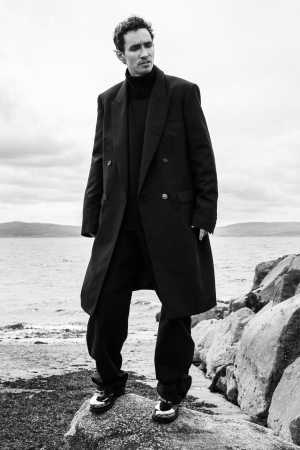
SM: You landed big roles in your early twenties. Did you enjoy the experience of fame at that relatively young age?
RS: They were brilliant jobs to get. Top jobs to get. They made me a level of famous that was absolutely manageable and meant there was still plenty of anonymity in my life. But the later-on fame…
SM: People assumed Joe Dempsie was like his character from Skins. He told me he used to play up to that image. Was the same true with you and Nathan?
RS: I completely understand and relate to that. But being somewhat contrarian, I would go against the grain. But I’ve heard countless times over the years, people go, ‘You’re just like your character for Misfits, mate.’ People see what they want to see.
SM: Unbelievable roles, though…
RS: I was very fortunate – all them lovely projects. I was used to being encouraged and complimented as a person for accessing the mischievous part of my nature for Nathan. Mischief to the max.
With Love/Hate, there’s a different aspect that was required. I didn’t contrive it but I took older members of my family, male members of my family, as templates who have a masculinity, a charisma, a stubbornness, a kind of mad, wild beauty. I suppose I’ve always thought about acting in terms of aspects, not the individual.
SHOP THE LOOK: Rings: Edge Only
Salthill promenade is a place of bright colours and a stream of docile traffic. Seagulls circle above casinos and coffee shops, a ferris wheel waits to begin the day’s rotation. The shore doesn’t exactly quicken the heart but the bay is a thing of beauty, sunlight sparkling on silver waves that roll beneath an open sky. The air carries a saltwater tang – you can spot the tourists because they’re the ones inhaling each breath like it’s their first. For a Londoner, breathing the air of the Irish coast is like drinking from a mountain stream instead of a week-old bottle of Volvic that’s been left inside a car.
Sheehan emerges from his apartment in a vest, flip flops and aviator sunglasses, a yoga instructor who got lost on the way to Bali. He’s rail thin, an assortment of angles constantly rearranging themselves beneath a face that must be 80% cheekbones. He never puts on weight: the actor Seán McGinley recently described him as looking like he’d never drank a Guinness in his life. “Maybe it’s because I’m a terribly anxious person,” muses Sheehan. Whatever, it’s working – he could easily pass for a decade younger than his 36 years. Stick him in a suit and he’s transformed into a human version of a Tim Burton cartoon.
Photoshoots are dependent on their subject. Sheehan is a dream: open to any suggestion, eager to create the coolest possible image. “Let’s do it!” could be his catchphrase. Wade into the sea? Sure! Pose by a deceased jellyfish? Not a problem. He even floats the idea of going on the ferris wheel but it hasn’t started turning yet.
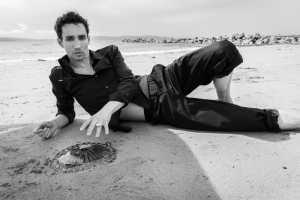
SHOP THE LOOK: Shirt and trousers: Alexander McQueen; Rings: Edge Only
We head to Blackrock diving board, which is actually a yellow concrete staircase equipped with blue railings. Swimmers are plentiful and Sheehan gets a fair few looks as he climbs to the highest platform in a tweed suit. Both he and our photographer Lee express their disappointment that he can’t jump into the sea for a shot – the clothing brand wouldn’t be thrilled. Round the corner, he changes outfits and dispenses tea from a large green flask. Two teenage girls come over to ask for a photo. “I would, but these clothes are stolen,” he says before breaking into a grin. The girls get their photo and scurry off, beaming.
The shoot is complete but there’s no time for the interview. “No bother,’ says Sheehan. “Let’s meet up after the play – I’ll be on more of a buzz then, anyway.” He’s looking down the barrel of three shows in 24 hours, and has no obligation to give up his Friday night for what is essentially another work commitment. But as I’m discovering, Sheehan isn’t merely a class actor but a class act.
Lee and I grab a pint after the shoot. We’re joined by Desmond Eastwood, another Reunion cast member and Sheehan’s temporary flatmate. Lee mentions the potential photograph of Sheehan jumping in the sea. “He’d have absolutely done it,” says Eastwood, a man not lacking in adventure himself – in the coming months, he will fight a charity boxing match and climb Mount Kilimanjaro. As we walk into town, who should cycle past us but Robert Sheehan, his overcoat flapping in the breeze.
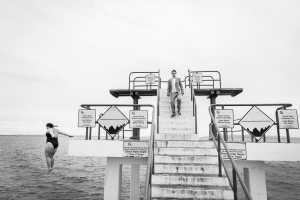
SM: Looking back on yourself pre-meditation, does it feel like a completely different person?
RS: I try not to worry too much about the concept I have now, in present day, about what I was like, quote, ‘pre-meditation’. I had ability and insight and curiosity. I had searching. I had many aspects that I still have, of course. But they were all being experienced from a different perspective, I suppose, a perspective much closer to them. And the binding ties were much tighter.
SM:It was very immediate?
RS: Yeah, very immediate. I was a very immediate person. I’m much less immediate now.
SM: And it’s better?
RS: Yes! It’s fucking way better, man. Because you get to be less of the surrender of other people’s intentions for you. You get to be less of the surrender of your own irrational emotions.
Here’s a good example. When someone says to me on the road, “Can I have a photo?” and I don’t want to do it, I go, “No, you can’t.” Whereas before, I would’ve gone through much more turmoil and inner pain if I’d said no. Saying no was to betray another aspect of myself. I had to learn how to be self-compassionate, which is part of zooming out the lens.
I’ve only been doing it for six or seven years, which means I’m basically a rookie. Trying to talk in a way like I know something. But ‘knowing’ is about a certain position in time-space. It’s naive from one perspective and it’s wise from another. So I’m wary of trying to come across too wise. We’re getting fucking circled!
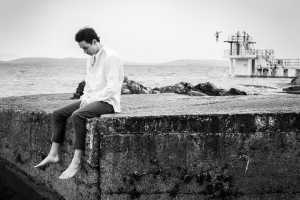
The following exchanges occurred not at McSwiggan’s but over the phone a few weeks later. I wanted to include them somewhere in the piece; here made the most sense.
SM: Before playing a new character, you like to mentally converse with them on a walk. How long does their voice stay with you, bubbling away in your head?
RS: It’s less that their voice is bubbling in my head. More that they get upgraded into the invisible memory, or the implicit memory as they call it in neurology, where it becomes more like riding a bicycle. It becomes almost like second nature. Don’t get me wrong, there is definitely an anticipatory voice bubbling away, especially before I’ve started filming or performing on stage.
I remember hearing Daniel Day-Lewis refer to it as fraying of the nerves – when you are essentially processing or coming up with voices, but initially the voices and the characters can be accompanied by an uncomfortable feeling. A feeling of, ‘Oh, this doesn’t feel right’, a gestation period, which can feel a little painful. Especially the older I get, weirdly, because the more settled I am in myself.
SM: It’s an interesting contrast with meditation. One practice stills the mind, the other fuels it…
RS: I suppose, yeah. The mind presents itself in many, many ways: in a feeling, in a voice, in a compulsion. It all adds in.
I’ve been doing this job for many years, so before I knew how to find a sense of centring in myself, as opposed to looking for it in other places, definitely all that work served to divide me.
SM: Might you gravitate to writing more than acting in the years ahead?
RS: I need one of two things for writing: either a lot of time or to write with somebody who inspires me. Writing doesn’t pay as well as acting at the moment. But I’m tending more towards writing. It’s a quieter creativity. You’re coming up with characters, plot, style, everything all in one, and I find the feeling of flow very addictive. The feeling of flow leads to good writing, good art.
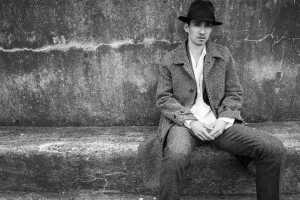
SHOP THE LOOK: Hat, Jack Murphy; Overcoat, Magee 1866; Donegal twee jacket; Shirt, Our Legacy @ Brown Thomas, Green trousers, Magee 1866; Boots, Our Legacy
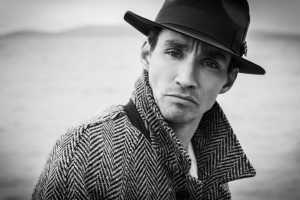
After that evening’s performance, I meet Sheehan in a nearby bar. He’s out back, flip flops now paired with a beautiful tweed overcoat and a pint of Guinness. Also present is his Reunion castmate Stephen Brennan, who dare I say steals the show as the monosyllabic Felix, an elderly divorcee unexpectedly granted a new lease of life.
“Every line of his gets a laugh,” sighs Sheehan. “And when you read the script, most of them don’t seem that funny!” (This isn’t a dig at the quality of the writing: Felix is a character whose stock phrase is ‘no’ and Brennan does a brilliant ‘no’, resignation, weariness, irritation all squeezed into a single grunted syllable.)
It’s been raining since late afternoon and only a handful of people are braving the backyard. They include three very nice women who saw the play earlier, and two men in the midst of what appears to be a grand night out. This being Galway, the conversation quickly converges. The men work together in the city’s prosperous hospitality sector; one does health and safety, the other HR. The HR manager speaks so fast it’s like someone put him on fast-forward. He takes great pleasure in dishing the dirt on the colleague beside him. “You know, for an HR manager,” says Sheehan, “he’s very indiscreet.”
You would struggle to find a less misanthropic soul than Robert Sheehan. He clearly loves people: over the course of the evening, I will see him talk to dozens of them and I’m unable to distinguish between those he knows and those who just stopped him for a chat. Disappearing Act bursts with vibrant, messy characters – from a sex-starved Medusa to the guy who ruins the funeral of a love rival.
Speaking of funerals – the HR manager is from County Mayo, whose Gaelic football team haven’t won an All-Ireland final since 1951, losing eleven in the interim. Supposedly the 1951 champions disrupted a funeral with their victory parade and the priest put a curse on the team. Sheehan recently listened to a podcast on the subject. “It’s gone mainstream,” he sighs. “The ‘Oirish’ and their curses.”
(One of my favourite anecdotes in Playing Dead involves Nicolas Cage telling a young Sheehan that he thinks his assistant is a leprechaun. Cage and Sheehan are filming Season of the Witch in an Austrian castle. Sheehan is only 20, too young to know the symbolism and history of the leprechaun in Irish culture – like Cage, he simply envisages a chubby little fellow with a ginger beard and green hat. Apparently Cage’s assistant was indeed a short man; I neglect to ask after his facial hair or preferred colour of clothing.)

The evening is ticking onwards; Sheehan and I say goodbye to our new friends and head off to conduct the interview. The thing about interviews is you need very little: a voice recorder and a relatively quiet place to talk. On Friday night in Galway, even a rainy one, the latter is a problem. We walk into two bars and walk out of two bars, our ears ringing. Third time’s a charm in the form of McSwiggan’s. There are a plethora of seating options… “Plethora!” cackles Sheehan. “You can tell he’s a writer!”
We take a table by the window and much of our subsequent conversation is secreted within this article. The two girls I mentioned earlier come up to our table. Indicating my open laptop, one of them asks if I’m on a Teams call. “He’s on something called ChatRoulette,” says Sheehan. Is that like Omegle? asks the girl. Neither Sheehan or I are familiar with Omegle but we establish that yes, it’s quite similar, although ChatRoulette offers a greater likelihood of seeing a random middle-aged man’s genitalia.
Sheehan talks to the girls about Irish rap trio Kneecap (he saw their gig last night) and life in Cork; we continue the interview; he goes off to take a phone call from his partner and I find myself taking comparative sips of Murphy’s and Guinness. (Reader: they taste exactly the same.) Sheehan reappears, needlessly apologetic. One of the girls asks him for a photo and he gently declines. “It’s a bit late. Come and find me tomorrow.” Another round is ordered.
Midnight lies in the rearview yet the population of McSwiggan’s keeps swelling. Sheehan gets chatting to a couple at the bar. Someone invites us to a lock-in round the corner – total strangers, I later discover, but lovely ones nonetheless. “There was something gorgeous about him,” F Scott Fitzgerald wrote of Jay Gatsby, “some heightened sensitivity to the promises of life…” These words would make a fitting epitaph for Robert Sheehan. Whether sitting in silent solitude or conversing with a new acquaintance in a crowded pub, the man is gorgeously attuned to the present moment – inside and outside himself.
Towards the end of Playing Dead, Sheehan speculates: “As far as I can work out, the story of life goes from wanting, to wanting less wanting, to ultimately wanting less.” Often these pithy phrases don’t stand up to scrutiny but the more I pondered the sentiment the truer it rang. “It’s annoyingly good,” I tell its author.
“It’s true though, isn’t it?” He is now living the second phase, the longest one. Not that he no longer wants – of course he does – but he wants less viscerally than he did as a younger man. He can cherish the landscape of the present moment without feeling the urge to race towards the horizon. He knows how to breathe.
“We become more risk averse as we get older,” says Sheehan. “We become more nurturing. Maybe a bit less self-involved. Less volatile. Less under the influence of drunkening emotions like libido or anger.
“Not to say that all those things fade. Love, I think, is not an emotion because you can be 85 years old, 95 years old and fall madly in love. So the nature of love is a bit different. But sometimes I think we give far too much credence to the individual.”
Maybe so. But what an individual he is!
View on Instagram
Playing Dead by Robert Sheehan is out now from £9.99 on amazon.co.uk

